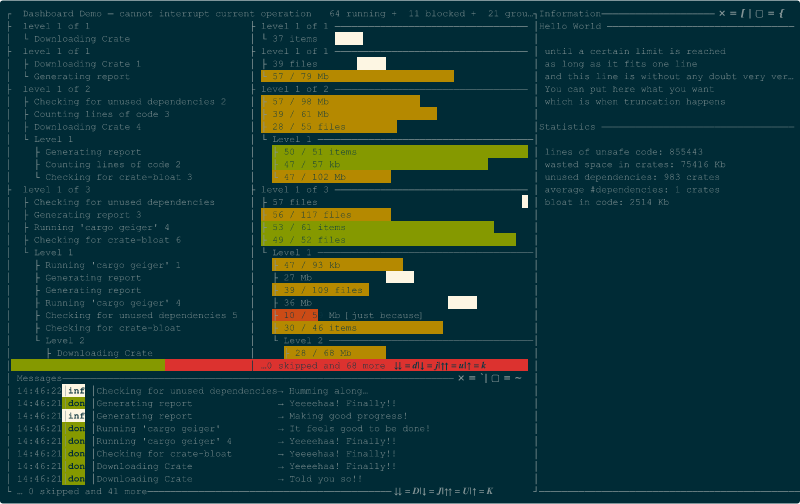99 stable releases (28 major)
| 29.0.2 | Apr 13, 2025 |
|---|---|
| 29.0.1 | Mar 11, 2025 |
| 29.0.0 | Jul 29, 2024 |
| 28.0.0 | Dec 29, 2023 |
| 1.2.0 | Mar 7, 2020 |
#27 in Asynchronous
1,021,303 downloads per month
Used in 367 crates
(10 directly)
190KB
4K
SLoC
prodash allows to integrate progress reporting into concurrent applications and provides renderers for displaying it in various ways.
It's easy to integrate thanks to a pragmatic API, and comes with a terminal user interface by default.
How to use…
Be sure to read the documentation at https://docs.rs/prodash, it contains various examples on how to get started.
Or run the demo application like so cd prodash && cargo run --all-features --example dashboard.
Feature Toggles
This crate comes with various cargo features to tailor it to your needs.
- progress-tree (default)
- Provide a
ProgressandRoottrait implementation for use with therender-lineandrender-tuibacked bydashmap. - progress-tree-hp-hashmap - high-performance registry for pregree tree nodes in case of ultra-heavy insertions and deletions.
- If this is necessary, it's probably impossible to resonably visualize the progress tree anyway, but the option exists nonetheless in case it is ever needed. Historically, this was the default, but now it seems simpler is better and just fine for typical programs.
- progress-tree-log (default)
- If logging in the
logcrate is initialized, alogwill be used to output all messages provided totree::Item::message(…)and friends. No actual progress is written. - May interfere with
render-tuiorrender-line, or any renderer outputting to the console.
- If logging in the
- Provide a
- progress-log
- A
Progressimplementation which logs messages and progress using thelogcrate
- A
- local-time
- If set, timestamps in the message pane of the
render-tuiwill be using the local time, not UTC - If set, timestamps of the log messages of the
render-linewill be using the local time, not UTC - Has no effect without the
render-tuiorrender-linerespectively
- If set, timestamps in the message pane of the
- render-line
- Provide a minimal line-based progress renderer which can be limited to a subset of the progress hierarchy.
- It's like the render-tui, but with far less dependencies and less visual fidelity - all it needs is to move the cursor a little while drawing characters and block graphics.
- Support for clicolors spec and no-color spec
- Supports initial delay that won't affect log messages, showing progress only when needed, automatically.
- Requires one of these additional feature flags to be set to be functional
- one required (mutually exclusive)
- render-line-crossterm - use the crossterm backend, useful for working on windows
- render-line-termion - use the termion backend, useful for lean unix-only builds
- one required (mutually exclusive)
- Optional features
- render-line-autoconfigure
- If enabled, calls to
render::line::Options::auto_configure()will configure the display based on whether or not we are in a terminal and set its color mode based on what's possible or desired.
- If enabled, calls to
- signal-hook
- If set, and the
hide_cursorline renderer option is set, the cursor will be hidden and SIG_INT and SIG_TERM handlers will be installed to reset the cursor on exit. Otherwise you have to make sure to callshutdown_and_wait()on theJoinHandlereturned to give the renderer a chance to undo the terminal changes. Failing to do so will leave the cusor hidden once the program has already finished. - Comes at the cost of an extra thread and additional dependencies.
- If set, and the
- render-line-autoconfigure
- render-tui
- Provide a terminal user interface visualizing every detail of the current progress state. It treats the terminal as a matrix display.
- Requires one of these additional feature flags to be set to be functional
** (one required, mutually exclusive)
- render-tui-crossterm
- Use the
crosstermcrate as terminal backend - Works everywhere natively, but has more dependencies
- You can set additional features like this
cargo build --features render-tui-crossterm,crossterm/event-stream
- Use the
- render-tui-termion
- Use the
termioncrate as terminal backend - It has less dependencies but works only on
unixsystems - to get this, disable default features and chose at least
render-tuiandrender-tui-termion.
- Use the
- render-tui-crossterm
- unit-bytes
- Supports dynamic byte display using the tiny
bytesizecrate.
- Supports dynamic byte display using the tiny
- unit-human
- Display counts in a way that is easier to grasp for humans, using the tiny
human_formatcrate.
- Display counts in a way that is easier to grasp for humans, using the tiny
- unit-duration
- Displays time in seconds like '5m4s' using the
jiffcrate's friendly duration format.
- Displays time in seconds like '5m4s' using the
Features
- fast insertions and updates for transparent progress tracking of highly concurrent programs
- a messages buffer for information about success and failure
- a terminal user interface for visualization, with keyboard controls and dynamic re-sizing
- unicode and multi-width character support
Limitations
- the line renderer is inherently limited in the amount of progress it can display without visual artifacts.
- it does copy quite some state each time it displays progress information and messages
- The underlying sync data structure,
dashmap, does not document every use of unsafe- I also evaluated
evmap, which has 25% less uses of unsafe, but a more complex interface. - Thus far it seemed 'ok' to use, who knows… we are getting mutable pieces of a hashmap from multiple threads, however, we never hand out multiple handles to the same child which should make actual concurrent access to the same key impossible.
- I also evaluated
- If there are more than 2^16 tasks
- then
- running concurrently on a single level of the tree, they start overwriting each other
- over its lifetime, even though they do not run concurrently, eventually new tasks will seem like old tasks (their ID wrapped around)
- why
- on drop, they never decrement a child count used to generate a new ID
- fix
- make the id bigger, like u32
- we should do that once there is a performance test
- then
- If the log lines are too long for the terminal width when using the line renderer
- then
- visual artifacts will appear
- why
- trying to draw beyond the terminal boundary will add a line break automatically, which can cause unexpected overdraw.
- fix
- count amount of blocks drawn, without ansi codes, and stop drawing at the boundary.
- then
Lessons Learned
drop()is not garantueed to be called when the future returns Ready and is in the futures::executor::ThreadPool- Workaround: drop and cleanup explicitly, prone to forgetting it.
- This is also why
futures::future::abortable()works (by stopping the polling), but doesn't as cleanup is not performed, even though it clearly would be preferred. - fix
- Use a join handle and await it - this will drop the future properly
select()might not work with complex futures - these should then beboxed()ifUnpinisn't implemented.
Dependencies
~0–11MB
~134K SLoC


